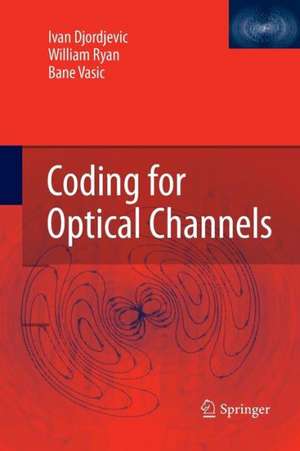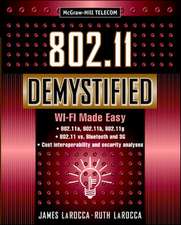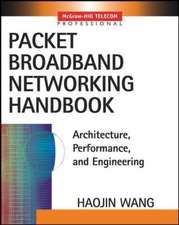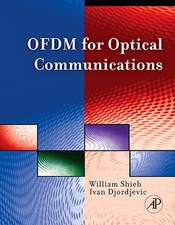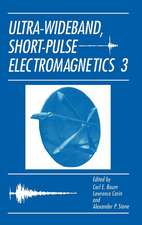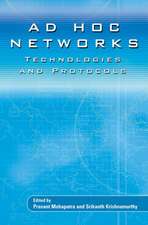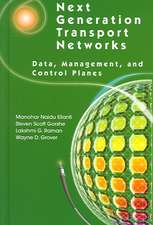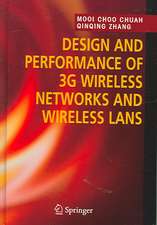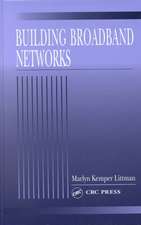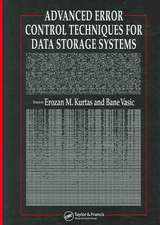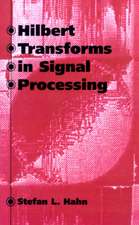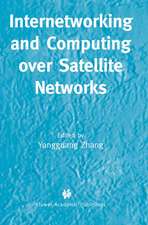Coding for Optical Channels
Autor Ivan Djordjevic, William Ryan, Bane Vasicen Limba Engleză Paperback – 5 sep 2014
This unique book represents a coherent and comprehensive introduction to the fundamentals of optical communications, signal processing and coding for optical channels. It is the first to integrate the fundamentals of coding theory with the fundamentals of optical communication.
| Toate formatele și edițiile | Preț | Express |
|---|---|---|
| Paperback (1) | 704.87 lei 6-8 săpt. | |
| Springer Us – 5 sep 2014 | 704.87 lei 6-8 săpt. | |
| Hardback (1) | 958.56 lei 6-8 săpt. | |
| Springer Us – 4 mar 2010 | 958.56 lei 6-8 săpt. |
Preț: 704.87 lei
Preț vechi: 829.25 lei
-15% Nou
Puncte Express: 1057
Preț estimativ în valută:
134.89€ • 139.35$ • 112.27£
134.89€ • 139.35$ • 112.27£
Carte tipărită la comandă
Livrare economică 25 martie-08 aprilie
Preluare comenzi: 021 569.72.76
Specificații
ISBN-13: 9781489983237
ISBN-10: 1489983236
Pagini: 460
Ilustrații: XV, 444 p.
Dimensiuni: 155 x 235 x 24 mm
Greutate: 0.64 kg
Ediția:2010
Editura: Springer Us
Colecția Springer
Locul publicării:New York, NY, United States
ISBN-10: 1489983236
Pagini: 460
Ilustrații: XV, 444 p.
Dimensiuni: 155 x 235 x 24 mm
Greutate: 0.64 kg
Ediția:2010
Editura: Springer Us
Colecția Springer
Locul publicării:New York, NY, United States
Public țintă
Professional/practitionerCuprins
Fundamentals of Optical Communication.- Channel Impairments and Optical Communication Systems Engineering.- Channel Coding for Optical Channels.- Graph-Based Codes.- Coded Modulation.- Turbo Equalization in Fiber-Optics Communication Systems.- Constrained Coding for Optical Communication.- Coding for Free-space Optical Channels.- Optical Channel Capacity.- Future Research Directions in Coding for Optical Channels.
Recenzii
From the reviews:
“This book covers a tremendous amount of ground. It is concerned primarily with the fundamentals of optical communications, digital signal processing and coding for optical channels. A particular strength of the book is its careful treatment of joint coding and modulation for optical communications. … The exposition is very clear and comprehensive. It should be most valuable to graduate students who are seeking to acquire the broad background knowledge needed to become successful researchers or engineers in optical and wireless communications.” (Christian Brosseau, Optics & Photonics News, May, 2011)
“This book covers a tremendous amount of ground. It is concerned primarily with the fundamentals of optical communications, digital signal processing and coding for optical channels. A particular strength of the book is its careful treatment of joint coding and modulation for optical communications. … The exposition is very clear and comprehensive. It should be most valuable to graduate students who are seeking to acquire the broad background knowledge needed to become successful researchers or engineers in optical and wireless communications.” (Christian Brosseau, Optics & Photonics News, May, 2011)
Textul de pe ultima copertă
Coding for Optical Channels
Ivan Djordjevic
William Ryan
Bane Vasic
In order to adapt to the ever-increasing demands for high-speed transmission and distance-independent connectivity, today’s network operators are implementing 100 Gb/s per dense wavelength division multiplexing (DWDM) channel. At those data rates, the performance of fiber-optic communication systems is degraded significantly due to intra- and inter-channel fiber nonlinearities, polarization-mode dispersion (PMD), and chromatic dispersion. In order to deal with these channel impairments, novel advanced techniques in modulation, detection, coding and signal processing are needed.
This groundbreaking book represents a coherent and comprehensive introduction to the fundamentals of optical communications, digital signal processing (DSP), and coding for optical channels. This book:
Ivan Djordjevic
William Ryan
Bane Vasic
In order to adapt to the ever-increasing demands for high-speed transmission and distance-independent connectivity, today’s network operators are implementing 100 Gb/s per dense wavelength division multiplexing (DWDM) channel. At those data rates, the performance of fiber-optic communication systems is degraded significantly due to intra- and inter-channel fiber nonlinearities, polarization-mode dispersion (PMD), and chromatic dispersion. In order to deal with these channel impairments, novel advanced techniques in modulation, detection, coding and signal processing are needed.
This groundbreaking book represents a coherent and comprehensive introduction to the fundamentals of optical communications, digital signal processing (DSP), and coding for optical channels. This book:
- Is the first to integrate the fundamentals of coding theory and DSP with the fundamentals of optical communication;
- Provides detailed coverage of joint coding and modulation for optical communications;
- Presents turbo equalization for joint iterative channel equalization and soft decoding on optical channels;
- Provides in-depth coverage of codes on graphs, including LDPC and turbo codes, and describes their application to optical channels;
- Includes coverage of both fiber-optics and free-space optical (FSO) channels;
- Is the first to cover the channel capacity of fiber-optic communication systems;
- Is the first to describe constrained coding for optical channels.
Caracteristici
Integrates the fundamentals of coding theory with the fundamentals of optical communication Provides detailed coverage of joint coding and modulation for optical communications Applies turbo equalization to integrate channel equalizers and soft iterative decoding for optical channels Includes coverage of both fiber-optics and free-space optical (FSO) channels Includes supplementary material: sn.pub/extras
